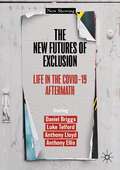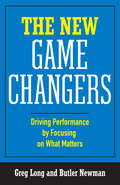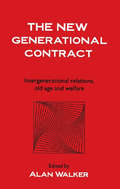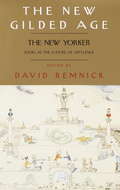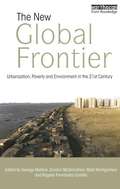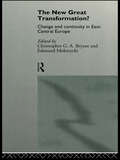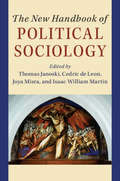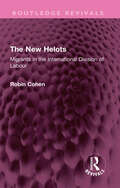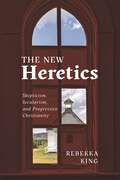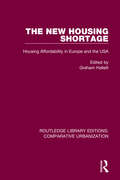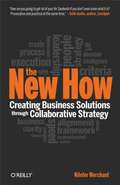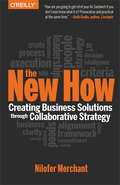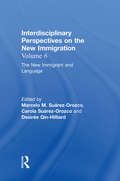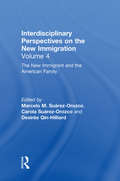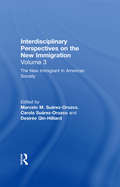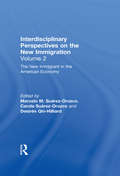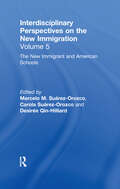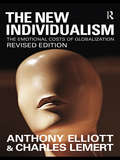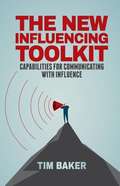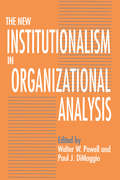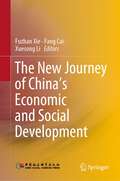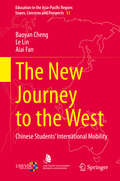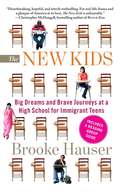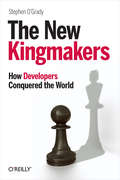- Table View
- List View
The New Futures of Exclusion: Life in the Covid-19 Aftermath
by Daniel Briggs Anthony Lloyd Anthony Ellis Luke TelfordBased upon global data and following on from Lockdown: Social Harm in the COVID-19 Era, this book discusses the rise of surveillance capitalism and new forms of control and exclusion throughout the Covid-19 pandemic. It particularly addresses the use of vaccine passports, mandates and the new forms of capital extraction and political control that emerged throughout the pandemic. The book also explicates how the ‘vaccine hesitant’ became marginalized in both mainstream discourse and through regulatory interventions. Whilst the book addresses the wider political economy within which so-called ‘anti-vaxxers’ were ostracized, it also explores the complex nature of their sentiments. The book closes by considering The New Futures of Exclusion, outlining the forms of surveillance and control that may be implemented in the future particularly in light of the challenges brought by global warming and the energy transition. It is a broadly accessible text, particularly appealing to policymakers, general readers and academics in sociology, political sociology, politics, human geography, political economy, criminology, social policy, psychology, history, and infectious diseases and medicine.
The New Game Changers: Driving Performance by Focusing on What Matters
by Greg Long Butler NewmanAs the business environment grows ever more complex and new competitors enter the market, the demands on leadership change. Conventional approaches won't cut it any longer. The New Game Changers tells the story of Aimee Martin, who rejoins her former company to turn around slumping sales. The sales training initiative that was implemented while she was away came highly recommended, but it was not well received by the frontline staff. And now the new head of marketing is proposing yet another initiative--a slick digital sales campaign.The trouble is, Aimee realizes, these approaches focus on the wrong things.Aimee's realization launches her on a quest that leads to her discovery of four essential strategies that help her focus on the outcomes that make a real impact and transform her leadership. The result: a winning team and business success!The New Game Changers is an easy-to-understand guide that teaches you a new way of thinking that will help you take your team and your organization to the next level.Greg Long and Butler Newman have worked together across multiple aspects of organizational improvement for over twenty-five years. They have collaborated many times to meet the specific needs of their clients and have extended that collaboration to produce this book, The New Game Changers: Driving Performance by Focusing on What Matters."Using top performers as a model is a powerful and effective way to improve performance. The New Game Changers' focus on top performers' outcomes is a potent methodology for optimizing individual and organizational success."--William Seidman, PhD, CEO, Cerebyte, Inc., and coauthor of The Star Factor"A must-read for any business leader, The New Game Changers is engaging and delightful in illustrating how to best leverage frontline performers to improve a company's bottom-line performance."--Ken Rebeck, President, KRA Associates, LLC
The New Generational Contract: Intergenerational Relations And The Welfare State
by Alan WalkerThis authoritative text offers the first comprehensive analysis of intergenerational relations and social welfare. It examines both the micro-sociological relations within the family and the social contract which forms the backbone of the welfare state.; This book is intended to appeal to undergraduates and postgraduates in sociology, social policy and medicine and it will also be particularly useful for professional courses such as nursing, social work and gerontology.
The New Gilded Age: The New Yorker Looks at the Culture of Affluence
by David RemnickIn keeping with its tradition of sending writers out into America to take the pulse of our citizens and civilization, The New Yorker over the past decade has reported on the unprecedented economy and how it has changed the ways in which we live. This new anthology collects the best of these profiles, essays, and articles, which depict, in the magazine's inimitable style, the mega-, meta-, monster-wealth created in this, our new Gilded Age. Who are the barons of the new economy? Profiles of Martha Stewart by Joan Didion, Bill Gates by Ken Auletta, and Alan Greenspan by John Cassidy reveal the personal histories of our most influential citizens, people who affect our daily lives even more than we know. Who really understands the Web? Malcolm Gladwell analyzes the economics of e-commerce in "Clicks and Mortar." Profiles of two of the Internet's most respected analysts, George Gilder and Mary Meeker, expose the human factor in hot stocks, declining issues, and the instant fortunes created by an IPO. And in "The Kids in the Conference Room," Nicholas Lemann meets McKinsey & Company's business analysts, the twenty-two-year-olds hired to advise America's CEOs on the future of their business, and the economy. And what defines this new age, one that was unimaginable even five years ago? Susan Orlean hangs out with one of New York City's busiest real estate brokers ("I Want This Apartment"). A clicking stampede of Manolo Blahniks can be heard in Michael Specter's "High-Heel Heaven." Tony Horwitz visits the little inn in the little town where moguls graze ("The Inn Crowd"). Meghan Daum flees her maxed-out credit cards. Brendan Gill lunches with Brooke Astor at the Metropolitan Club. And Calvin Trillin, in his masterly "Marisa and Jeff," portrays the young and fresh faces of greed. Eras often begin gradually and end abruptly, and the people who live through extraordinary periods of history do so unaware of the unique qualities of their time. The flappers and tycoons of the 1920s thought the bootleg, and the speculation, would flow perpetually--until October 1929. The shoulder pads and the junk bonds of the 1980s came to feel normal--until October 1987. Read as a whole, The New Gilded Age portrays America, here, today, now--an epoch so exuberant and flush and in thrall of risk that forecasts of its conclusion are dismissed as Luddite brays. Yet under The New Yorker's examination, our current day is exposed as a special time in history: affluent and aggressive, prosperous and peaceful, wired and wild, and, ultimately, finite.
The New Global Frontier: Urbanization, Poverty And Environment In The 21st Century
by George Martine Gordon Mcgranahan Mark Montgomery Rogelio Fernandez-CastillaThe world's developing countries will be experiencing massive increases in their urban populations over the 21st century. If managed intelligently and humanely, this growth can pave the way to sustainable development; otherwise, it will favour higher levels of poverty and environmental stress. The outcome depends on decisions being made now. The principal theme that runs through this volume is the need to transform urbanization into a positive force for development. Part I of this book reviews the demography of the urban transition, stressing the importance of beneficial rural-urban connections and challenging commonly held misconceptions. Part II asks how urban housing, land and service provision can be improved in the face of rapid urban expansion, drawing lessons from experiences around the world. Part III analyses the challenges and opportunities that urbanization presents for improving living environments and reducing pressures on local and global ecosystems. These social and environmental challenges must be met in the context of fast-changing demographic circumstances; Part IV explores the range of opportunities that these transformations represent. These challenges and opportunities vary greatly across Africa, Asia and Latin America, as detailed in Part V. Published with IIED and UNFPA
The New Great Transformation?: Change and Continuity in East-Central Europe
by Christopher G.A. Bryant Edmund MokrzyckiThis timely and assured book provides an essential guide to one of the biggest social, political and economic developments of our time.
The New Handbook of Political Sociology
by Isaac William Martin Thomas Janoski De Leon Cedric Joya MisraPolitical sociology is a large and expanding field with many new developments, and The New Handbook of Political Sociology supplies the knowledge necessary to keep up with this exciting field. Written by a distinguished group of leading scholars in sociology, this volume provides a survey of this vibrant and growing field in the new millennium. The Handbook presents the field in six parts: theories of political sociology, the information and knowledge explosion, the state and political parties, civil society and citizenship, the varieties of state policies, and globalization and how it affects politics. Covering all subareas of the field with both theoretical orientations and empirical studies, it directly connects scholars with current research in the field. A total reconceptualization of the first edition, the new handbook features nine additional chapters and highlights the impact of the media and big data.
The New Helots: Migrants in the International Division of Labour (Routledge Revivals)
by Robin CohenOriginally published in 1987 and now reissued with a substantial introduction by Robin Cohen, this wide-ranging work of comparative and historical sociology argues that a major engine of capital’s growth lies in its ability to find successive cohorts of quasi-free workers to deploy in the farms, mines and factories of an expanding international division of labour. These workers, like the helots of ancient Greece, are found at the periphery of ‘regional political economies’ or in the form of modern migrants, sucked into the vortex of metropolitan service or manufacturing industry. The regions of Southern Africa; the USA and the circum-Caribbean; European and its colonial and southern hinterlands, are systematically compared – yielding original and, in some cases, uncomfortable analogies between countries previously thought to be wholly different in terms of their political structures and guiding values. The New Helots has been written with both an undergraduate and professional readership in mind. Students of history, sociology and economics as well as those interested in patterns of migration and ethnic relations will find it of interest.
The New Heretics: Skepticism, Secularism, and Progressive Christianity
by Rebekka KingCharts the development of progressive Christianity’s engagement with modern science, historical criticism, and liberal humanismChristians who have doubts about the existence of God? Who do not believe in the divinity of Jesus? Who reject the accuracy of the Bible? The New Heretics explores the development of progressive Christianity, a movement of Christians who do not reject their identity as Christians, but who believe Christianity must be updated for today’s times and take into consideration modern science, historical criticism, and liberal humanism.Drawing on three years of ethnographic fieldwork in North America, Rebekka King focuses on testimonies of deconversion, collective reading practices, and the ways in which religious beliefs and practices are adapted to fit secular lives. King introduces the concept of “lived secularity” as a category with which to examine the ways in which religiosity often is entangled with and subsumed by secular identities over and against religious ones. This theoretical framework provides insight into the study of religious and cultural hybridity, new emerging groups such as “the nones,” atheism, religious apostasy, and multi-religious identities. The New Heretics pays close attention to the ways that progressive Christians understand themselves vis-à-vis a conservative or fundamentalist Christian “other,” providing context concerning the presumed divide between the religious right and the religious left. King shows that while it might be tempting to think of progressive Christians as atheists, there are religious and moral dimensions to their disbelief. For progressive Christians the act of questioning and rejecting God—alongside other theological tenets—is framed as a moral activity. Ultimately, the book showcases the importance of engaging with the ethics of belief in understanding contemporary Christianity.
The New Housing Shortage: Housing Affordability in Europe and the USA
by Graham HallettOriginally published in 1993, this book is a detailed comparative examination of the housing issue by housing experts, looking at the USA, UK, Germany, the Netherlands and France. The volume offers an excellent blend of critical analysis and practical policy recommendations, including a better targeting of tax concessions, a move back to social housing more diverse than in the past and measures for reducing homelessness. Perennial issues which remain as pertinent today as when the book was first published are also discussed: homelessness, housing affordability for people on low incomes, changes in housing markets.
The New How
by Nilofer MerchantWhat people are saying about The New How "How are you going to get rid of your Air Sandwich if you don't even know what it is? Provocative and practical at the same time." --Seth Godin, author of Linchpin "The New How is informative and provides exciting insights because the suggestions are practical and doable. Merchant gets the new reality--leadership fails not so much from flawed strategy as it does from failed processes of engagement from those responsible for implementing the strategy. In high-performing organizations, everyone acts like a leader, and they own the strategy and take actions to ensure its success. If you care about making a difference, read this book." --Barry Posner, author of The Leadership Challenge "Collaboration is a powerful, competitive weapon: this book shows you how to use it to win markets." --Mark Interrante, VP Content Products, Yahoo, Inc. "In a world in which the pace of change is ever quickening, collaboration, not control, is the route to a successful organization. This book tells you how to make your organization collaborative. And Nilofer Merchant's writing is a model of clarity." --Barry Schwartz, author of The Paradox of Choice: Why More Is Less "Want to transform your organization into a collaborative enterprise? Nilofer Merchant provides insightful and practical strategies in The New How." --Padmasree Warrior, CTO, Cisco Systems, Inc. "Merchant's book is a practical guide for the journey from strategy to implementation. The collaborative tools described here can help companies reach strategic success--and avoid pitfalls along the way." --Tom Kelley, General Manager, IDEO, and author of Ten Faces of InnovationOnce in a generation, a book comes along that transforms the business landscape. For today's business leaders, The New How redefines the way companies create strategies and win new markets. Management gurus have always said "people matter." But those same gurus still relegate strategy to an elite set of executives who focus on frameworks, long presentations, and hierarchical approaches. Business strategy typically has been planned by corporate chiefs in annual meetings, and then dictated to managers to carry out. The New How turns that notion on its head. After many years of working with Apple, Adobe, HP, and many other companies, Nilofer Merchant discovered the secret sauce: the best way to create a winning strategy is to include employees at all levels, helping to create strategy they not only believe in, but are also equipped to implement. In The New How, Nilofer shows today's corporate directors, executives, and managers how they can transform their traditional, top-down approach to strategy planning and execution into collaborative "stratecution" that has proven to be significantly more effective. Enhance performance and outcomes by deflating the "air sandwich" between executives in the boardroom and employees Recognize that strategy and execution are thoroughly intertwined Understand how successful strategy is founded in effective idea selection-a pile of good ideas doesn't necessarily build good strategy Create company strategy and link it to targeted execution, using the practical models and techniques provided
The New How [Paperback]: Creating Business Solutions Through Collaborative Strategy
by Nilofer MerchantWhat people are saying about The New How"How are you going to get rid of your Air Sandwich if you don't even know what it is? Provocative and practical at the same time."--Seth Godin, author of Linchpin"The New How is informative and provides exciting insights because the suggestions are practical and doable. Merchant gets the new reality--leadership fails not so much from flawed strategy as it does from failed processes of engagement from those responsible for implementing the strategy. In high-performing organizations, everyone acts like a leader, and they own the strategy and take actions to ensure its success. If you care about making a difference, read this book."--Barry Posner, author of The Leadership Challenge"Collaboration is a powerful, competitive weapon: this book shows you how to use it to win markets."--Mark Interrante, VP Content Products, Yahoo, Inc."In a world in which the pace of change is ever quickening, collaboration, not control, is the route to a successful organization. This book tells you how to make your organization collaborative. And Nilofer Merchant's writing is a model of clarity."--Barry Schwartz, author of The Paradox of Choice: Why More Is Less"Want to transform your organization into a collaborative enterprise? Nilofer Merchant provides insightful and practical strategies in The New How."--Padmasree Warrior, CTO, Cisco Systems, Inc."Merchant's book is a practical guide for the journey from strategy to implementation. The collaborative tools described here can help companies reach strategic success--and avoid pitfalls along the way."--Tom Kelley, General Manager, IDEO, and author of Ten Faces of InnovationOnce in a generation, a book comes along that transforms the business landscape. For today's business leaders, The New How redefines the way companies create strategies and win new markets.Management gurus have always said "people matter." But those same gurus still relegate strategy to an elite set of executives who focus on frameworks, long presentations, and hierarchical approaches. Business strategy typically has been planned by corporate chiefs in annual meetings, and then dictated to managers to carry out. The New How turns that notion on its head. After many years of working with Apple, Adobe, HP, and many other companies, Nilofer Merchant discovered the secret sauce: the best way to create a winning strategy is to include employees at all levels, helping to create strategy they not only believe in, but are also equipped to implement.In The New How, Nilofer shows today's corporate directors, executives, and managers how they can transform their traditional, top-down approach to strategy planning and execution into collaborative "stratecution" that has proven to be significantly more effective.Enhance performance and outcomes by deflating the "air sandwich" between executives in the boardroom and employeesRecognize that strategy and execution are thoroughly intertwinedUnderstand how successful strategy is founded in effective idea selection-a pile of good ideas doesn't necessarily build good strategyCreate company strategy and link it to targeted execution, using the practical models and techniques provided
The New Immigrant and Language: Interdisciplinary Perspectives on the New Immigration
by Marcelo M. Suárez-Orozco Carola Suárez-Orozco Desirée Qin-HilliardFirst Published in 2002. Routledge is an imprint of Taylor & Francis, an informa company.
The New Immigrant and the American Family: Interdisciplinary Perspectives on the New Immigration
by Marcelo M. Suárez-Orozco Carola Suárez-Orozco Desirée Qin-HilliardFirst Published in 2002. Routledge is an imprint of Taylor & Francis, an informa company.
The New Immigrant in American Society: Interdisciplinary Perspectives on the New Immigration
by Marcelo M. Suárez-Orozco Carola Suárez-Orozco Desirée Qin-HilliardFirst published in 2002. Routledge is an imprint of Taylor & Francis, an informa company.
The New Immigrant in the American Economy: Interdisciplinary Perspectives on the New Immigration
by Marcelo M. Suárez-Orozco Carola Suárez-Orozco Desirée Qin-HilliardFirst Published in 2002. Routledge is an imprint of Taylor & Francis, an informa company.
The New Immigrants and American Schools: Interdisciplinary Perspectives on the New Immigration
by Marcelo M. Suárez-Orozco; Carola Suárez-Orozco; Desirée Qin-HilliardThis six-volume set focuses on Latin American, Caribbean, and Asian immigration, which accounts for nearly 80 percent of all new immigration to the United States. The volumes contain the essential scholarship of the last decade and present key contributions reflecting the major theoretical, empirical, and policy debates about the new immigration. The material addresses vital issues of race, gender, and socioeconomic status as they intersect with the contemporary immigration experience. Organized by theme, each volume stands as an independent contribution to immigration studies, with seminal journal articles and book chapters from hard-to-find sources, comprising the most important literature on the subject. The individual volumes include a brief preface presenting the major themes that emerge in the materials, and a bibliography of further recommended readings. In its coverage of the most influential scholarship on the social, economic, educational, and civil rights issues revolving around new immigration, this collection provides an invaluable resource for students and researchers in a wide range of fields, including contemporary American history, public policy, education, sociology, political science, demographics, immigration law, ESL, linguistics, and more.
The New Individualism: The Emotional Costs of Globalization REVISED EDITION
by Anthony Elliott Prof Charles LemertThis is a new and revised edition of a book which has had a major impact upon the social sciences and public political debate. Anthony Elliott and Charles Lemert's THE NEW INDIVIDUALISM inspired readers with the dramatic suggestion that 'the reinvention craze' - from self-help and therapy culture to management restructurings and corporate downsizings - is central to a 'new individualism' sweeping the globe. Giving particular attention to the narratives of people seeking to define anew their lives in an age of globalization, the authors contend that an endless hunger for instant change and relentless emphasis on self-reinvention is fundamental to grasping the disorientating effects of the new individualism. This edition contains a substantial new Introduction in which Elliott and Lemert reply to some of the standard criticisms made of the theory of the new individualism, and also addresses the escalation of new individualist thinking in the wake of recent global crises.
The New Influencing Toolkit
by Tim BakerWithout influence, managers are ineffective. In today's workplace, managers need to influence up, down and increasingly, sideways as organizations become less hierarchical. This book is expertly designed to diagnose and develop managerial influence, focusing on four key strategies: investigating, calculating, motivating and collaborating.
The New Institutionalism in Organizational Analysis
by Edited by Walter W. Powell Paul J. DimaggioLong a fruitful area of scrutiny for students of organizations, the study of institutions is undergoing a renaissance in contemporary social science. This volume offers, for the first time, both often-cited foundation works and the latest writings of scholars associated with the "institutional" approach to organization analysis. In their introduction, the editors discuss points of convergence and disagreement with institutionally oriented research in economics and political science, and locate the "institutional" approach in relation to major developments in contemporary sociological theory. Several chapters consolidate the theoretical advances of the past decade, identify and clarify the paradigm's key ambiguities, and push the theoretical agenda in novel ways by developing sophisticated arguments about the linkage between institutional patterns and forms of social structure. The empirical studies that follow-involving such diverse topics as mental health clinics, art museums, large corporations, civil-service systems, and national polities-illustrate the explanatory power of institutional theory in the analysis of organizational change. Required reading for anyone interested in the sociology of organizations, the volume should appeal to scholars concerned with culture, political institutions, and social change.
The New Institutionalism in Organizational Analysis
by Walter W. Powell Paul J. DiMaggioLong a fruitful area of scrutiny for students of organizations, the study of institutions is undergoing a renaissance in contemporary social science. This volume offers, for the first time, both often-cited foundation works and the latest writings of scholars associated with the "institutional" approach to organization analysis. In their introduction, the editors discuss points of convergence and disagreement with institutionally oriented research in economics and political science, and locate the "institutional" approach in relation to major developments in contemporary sociological theory. Several chapters consolidate the theoretical advances of the past decade, identify and clarify the paradigm's key ambiguities, and push the theoretical agenda in novel ways by developing sophisticated arguments about the linkage between institutional patterns and forms of social structure. The empirical studies that follow—involving such diverse topics as mental health clinics, art museums, large corporations, civil-service systems, and national polities—illustrate the explanatory power of institutional theory in the analysis of organizational change. Required reading for anyone interested in the sociology of organizations, the volume should appeal to scholars concerned with culture, political institutions, and social change.
The New Journey of China’s Economic and Social Development
by Fang Cai Xuesong Li Fuzhan XieThis book aims at China's economic and social development, which has embarked on a new journey. It collects more than 20 major research achievements of researchers in relevant fields of the Chinese Academy of Social Sciences. These topics cover rural revitalization and anti-poverty, industrialization and manufacturing transformation, service industry upgrading, fiscal and taxation system and fiscal sustainability, major financial reform, industry and competition policy, ownership structure, new pattern of opening up, digital economy, innovation driven, financial stability, macro-control, new urbanization, regional development, ecological environment, aging population, labor market, income distribution, social governance, people's livelihood, social security, the rule of law, cultural power, and other major issues. This book helps people from all walks of life better understand and grasp the new trends, opportunities, and challenges of China's economic and social development in the future and provides useful reference for thinking about China's medium and long-term development strategy and development path.
The New Journey to the West: Chinese Students’ International Mobility (Education in the Asia-Pacific Region: Issues, Concerns and Prospects #53)
by Baoyan Cheng Le Lin Aiai FanThis book provides a comprehensive assessment of the cross-border mobility of Chinese students and addresses the questions of who in China chooses to study overseas, why they want to do so, and what the impacts of this mobility are on China’s social stratification. In addition, it explores the challenges that these students face in terms of adaptation and identity formation once they have arrived in the destination country. Adopting a push-and-pull framework to analyze the data, it offers a unique and insightful resource.
The New Kids
by Brooke HauserSome walked across deserts and mountains to get here. Others flew in on planes. One arrived after escaping in a suitcase. And some won't say how they got here. These are "the new kids": new to America and all the routines and rituals of an American high school, from lonely first days to prom. They attend the International High School at Prospect Heights in Brooklyn, which is like most high schools in some ways--its halls are filled with students gossiping, joking, flirting, and pushing the limits of the school's dress code--but all of the students are recent immigrants learning English. Together, they come from more than forty-five countries and speak more than twenty-eight languages. A singular work of narrative journalism, The New Kids chronicles a year in the life of a remarkable group of these teenage newcomers--a multicultural mosaic that embodies what is truly amazing about America. Hauser's unforgettable portraits include Jessica, kicked out of her father's home just days after arriving from China; Ngawang, who spent twenty-four hours folded up in a small suitcase to escape from Tibet; Mohamed, a diamond miner's son from Sierra Leone whose arrival in New York City is shrouded in mystery; Yasmeen, a recently orphaned Yemeni girl who is torn between pursuing college and marrying so that she can take care of her younger siblings; and Chit Su, a Burmese refugee who is the only person to speak her language in the entire school. The students in this modern-day Babel deal with enormous obstacles: traumas and wars in their countries of origin that haunt them, and pressures from their cultures to marry or to drop out and go to work. They aren't just jostling for their places in the high school pecking order--they are carving out new lives for themselves in America. The New Kids is immersion reporting at its most compelling as Brooke Hauser takes us deep inside the dramas of five International High School students who are at once ordinary and extraordinaryin their separate paths to the American Dream. Readers will be rooting for these kids long after reading the stories of where they came from, how they got here, and where they are going next.
The New Kingmakers: How Developers Conquered the World
by Stephen O'GradyThe New Kingmakers documents the rise of the developer class, and provides strategies for companies to adapt to the new technology landscape. From recruiting to retention, it provides a playbook to work more efficiently and effectively with the most important members of your organization.
